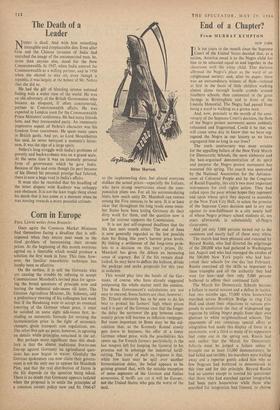The Death of a Leader
NEHRU is dead. And with him something intangible and irreplaceable dies. Even after Goa and the Chinese invasion of India had smirched the image of the uncommitted man, he, more than anyone else, stood for the New Commonwealth. In 1947, when India entered the Commonwealth. as a willing partner, and in 1950 when she elected to stay on, even though a republic, it was largely at the behest of Mr. Nehru that she did so.
He had the gift of blending intense national feeling with a wider view of the world. He was an old adversary of the British Government who became an eloquent, if often controversial, partner in Commonwealth affairs. He was expected in London soon for the Commonwealth Prime Ministers' conference. He had many friends here, and they transcended party. An immensely impressive aspect of Nehru's character was his freedom from resentment. He spent many years in British gaols. And yet, as Lord Mountbatten has said, he never betrayed a moment's bitter- ness. It was the sign of a large spirit.
Nehru's long struggle with India's problems of poverty and backwardness was on a grand scale. At the same time it was an intensely personal form of government which he gave India. Because of this and even though (in part because of his illness) his personal prestige had faltered, there is now a huge void in India's affairs.
It must also be recorded that his handling of the bitter dispute with Kashmir was unhappy and obstinate. It is not the least tragic thing about his death that it has come at a moment when he was moving towards a more peaceful attitude.


































 Previous page
Previous page